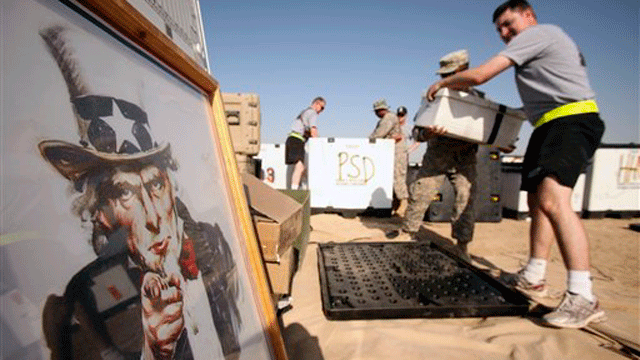
A poster depicting "Uncle Sam" is seen at left as U.S. Army soldiers from the 49th Military Police Brigade pack up their gear as the unit prepares to ship their equipment and belongings home Sunday, July 18, 2010 at Camp Victory in Baghdad, Iraq. (AP)
The Pentagon is probing allegations that Navy medical personnel tested the use of an over-the-counter dietary supplement on 80 wounded U.S. soldiers to determine its effectiveness for treating mild brain injuries, the Pentagon's Office of Inspector General confirmed to Fox News.
The inspector general launched its probe in June 2009, one month after receiving a hotline complaint of suspected research misconduct by a U.S. Navy captain and physician who had served with the U.S.-led coalition in Iraq, said Jennifer Plozai, a spokeswoman for the inspector general.
The possible research misconduct involved the use of the dietary supplement N-Acetyl Cysteine,(NAC), an antioxidant that is readily available over the counter.
The U.S. Navy also is conducting a probe into possible clinical research misconduct and potential UCMJ (Uniform Code of Military Justice) violations as well as "a review of the standard of care provided to the service members involved in this clinical research project," Plozai said in a written statement, adding that she cannot comment further on the ongoing investigations.
The clinical trial in Iraq, conducted by Dr. Michael Hoffer of the United States Navy Medical Center in San Diego, aimed to test whether a drug made to treat Tylenol overdoses could also alleviate the effect of traumatic brain injury in troops who were wounded by explosions.
But the study was never formally submitted for appropriate review under Navy regulations, said Cmdr. Cappy Surette, a Navy Medicine spokesman.
"It's important to note that Navy Medicine's research efforts are governed by a highly regulated process in accordance with a DOD [Department of Defense] body of ethics, providing the highest level of patient safety and patient consent," Surette said in an e-mail to Fox News. "Navy regulations regarding medical research are the same as DOD's (and FDA and CDC for that matter.) It's called the 'common rule' where any federal agency conducting medical research follow the same guidelines."
The Navy Medical Center referred all questions from FoxNews.com to the Pentagon. A Pentagon spokeswoman declined to comment.
Arthur Caplan, director of the Center for Bioethics at the University of Pennsylvania, told the Boston Globe, which reported on the investigation on Monday, that medical tests on human subjects must follow strict rules in their design and execution to protect the safety of patients.
Test subjects must be competent and able to understand the test and its implications, participation must be voluntary without any pressure, and all test subjects must be fully informed of the potential risks before they consent to take part, he told the newspaper.
It is not clear whether any of the soldiers were harmed by the clinical trial.
The trial began in late 2008 and was due to be finished this summer with an enrollment of 150 active duty U.S. service members, both men and women, ages 18-50, the Globe reported. Service members who needed emergency surgery for their wounds were not to be included in the study, the newspaper said.
The Iraq study proposed giving patients N-Acetyl Cysteine for seven days after exposure to a blast and then to watch for improvement in hearing and balance, the newspaper reported. The progress of the patients who received the antioxidant was to be compared to a group given a placebo, the newspaper said.
Correction: August 3, 2010
An earlier version of this article incorrectly stated that the Boston Globe first reported on the investigation. In fact, the Center for Public Integrity broke the story on July 30.












































